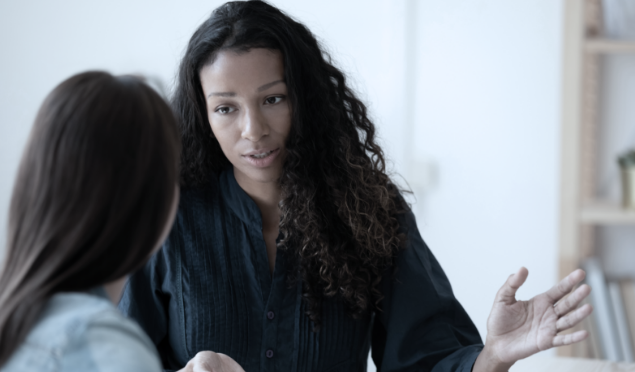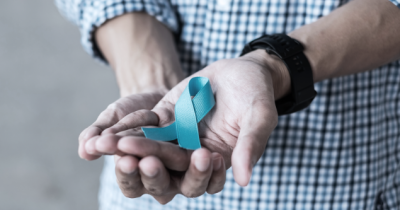Tackling the elephant in the room: how to talk to someone diagnosed with breast cancer

Published on 6th October, 2020 at 08:07 am
Wondering how to be supportive to a loved one who’s received a breast cancer diagnosis or is currently in treatment? Here are some suggestions from the experts on what you should – and shouldn’t – say to a breast cancer patient.
What you shouldn’t say
“Breast cancer isn’t as bad as it used to be”
“Breast cancer is bad, full stop,” says counselling psychologist Elise Fourie, who is a cancer survivor herself and counsels many people diagnosed with cancer. “Despite the advances in the treatment of breast cancer, it remains unpredictable whether a person will go into remission, and if so, stay in remission.” It’s also important to remember that breast and cervical cancers are the leading cause of death among South African women, with breast cancer being the most diagnosed cancer, with a lifetime risk of 1 in 25, according to the 2016 National Cancer Registry (NCR).
“Don’t dwell on this”
“Don’t tell a cancer patient to ‘get over it’ or not to let it get them down,” says Fourie. “It’s difficult to ‘get over’ the fear and sadness, and even more difficult not to dwell on their diagnosis, leaving family behind and the fear of dying.”
“What are your odds?” or “How long do you have?”
“This is insensitive, and it may negatively impact your loved one or friend and discourage them from holding on to hope,” says Fourie. Jo’burger Vivien Cory, 66, who was living with lobular breast cancer in remission, has recently been diagnosed with metastatic cancer (cancer that has spread to a different body part from where it started), says this is the hardest to hear: “It’s tough to hear an inquisitive friend ask, ‘How long do you have?’ This can quickly send me into an anxious or depressive slump.”
Feeling down due to a diagnosis? Speak to a trauma counsellor for free via your Trauma, Assault & HIV Assist benefit.
“Have you tried…?”
“Avoid giving advice,” says Fourie. It’s not helpful to suggest that yoga, juicing or anything else can treat your friend’s breast cancer, or telling the person to try a specific treatment, Fourie explains. Each breast cancer patient has to decide for themselves how their journey will progress and to whom they will turn for advice.
“Do you think you got cancer because of…?”
“Avoid trying to find a cause,” says Fourie. “For example, ‘I have read that sugar causes cancer, perhaps this played a role?’ Also avoid blaming the person, for example, ‘You shouldn’t be smoking’ or ‘You shouldn’t have used that deodorant.’”
What to say instead
“I’m sorry to hear you are going through this”
“A simple expression of sympathy goes a long way towards helping the person diagnosed with breast cancer feel that the other person truly cares,” says Fourie.
“I can’t imagine what you must be going through”
“Contact them regularly and simply ask, ‘How are you?’. Then just listen and empathise with something like, ‘I can’t imagine what you must be going through, but please know that I care and you are in my thoughts,’” says Fourie.
“We’ll get through this together; I am here for you and am a member of your support team”
“The caregivers of someone diagnosed with breast cancer can sometimes become tired, sad and overwhelmed, too,” explains Fourie. “It is comforting for someone diagnosed with breast cancer to know that other people are part of their support system.”
Nothing
“Listen without always feeling that you have to respond. Sometimes a caring listener is what the person needs most,” advises The Cancer Association of South Africa (CANSA). Research has shown that – in addition to early detection, treatment and care – a positive outlook and support from family and friends play an essential role in a cancer survivor’s recovery. “Try not to let your friend’s condition get in the way of your friendship,” says Cory. “Treat them the same way you always have and don’t give up on them. Keep your conversation light, cheerful and full of laughter.”
Simple guidelines to use when talking to your friend
Avoid saying:
- I know just how you feel
- You need to talk
- I know just what you should do
- I feel helpless
- I don’t know how you manage
- I’m sure you’ll be fine
- “You should do this” or “I don’t think you should do this”. Avoid offering unsolicited advice or being judgemental.
- Don’t worry
- How much time do the doctors give you?
Do say:
- I’m sorry this has happened to you
- If you ever feel like talking, I am here to listen
- What are you thinking of doing, and how can I help?
- I care about you
Source: CANSA
How to support a loved one in other ways
- Give your friend space, but offer to visit when he or she would like.
- Make plans for the future – this gives your friend something to look forward to.
- When you commit to help, follow through. For example, if you offer to bring a meal over on Sunday.
- Shop for groceries and pick up prescriptions.
- Help with chores around the house, such as getting the mail, taking care of pets, cleaning, doing laundry, taking care of plants and flowers and taking out the garbage.
- Baby-sit children, take them to and from school and evening activities and arrange for play dates.
- Give your friend a ride to an appointment/support group or take notes during a doctor’s appointment.
- You can also keep your friend company during a treatment session by sitting with him or her during a chemotherapy session.
- Take a scenic drive with your friend when he/she is too weak to take a stroll in the park.
- If you want to talk to someone, you can get counselling telephonically via your Trauma, Assault & HIV Assist benefit.
Supplied by CANSA
Why regular self-examinations are so important
According to the Breast Health Foundation, 70% of all breast cancer is found through self-checks. Proper regular self-examination is key to early detection and effective treatment.
Gerda Strauss, CANSA’s Head: Service says, “We know that we’re living in unprecedented times with COVID-19 taking centre stage in our lives; however, the cancer risk does not go away due to the pandemic, and women still need to go for regular cancer screening, as early detection saves lives.”
See how to do a breast cancer self-examination here.
Want to learn more?
We send out regular emails packed with useful advice, ideas and tips on everything from saving and investing to budgeting and tax. If you're a Sanlam Reality member and not receiving these emails, update your contact details now.
Update Now







